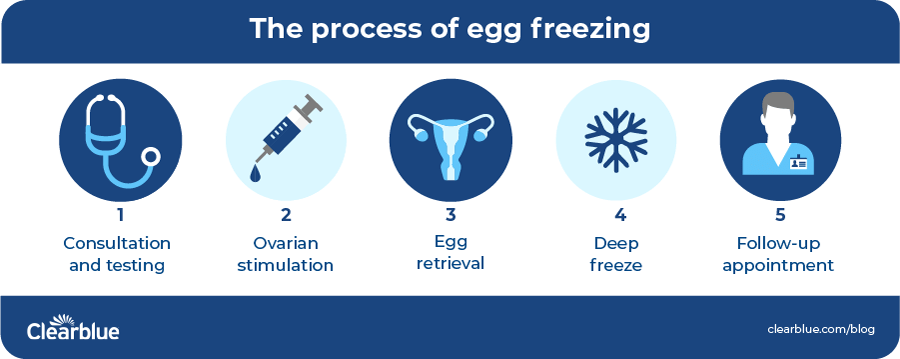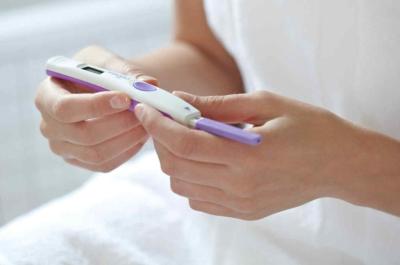Should I Freeze My Eggs ?

If you are considering egg freezing and IVF, be sure to check local regulations.
As you’re planning for a family, you might come across oocyte cryopreservation — or its more common term, egg freezing. Preserving a woman’s eggs for potential future use through cryopreservation is an option that gives women more flexibility when family planning. Egg freezing is considered a type of Assisted Reproductive Technology (ART), which is becoming a more common way of conceiving. The use of ART has more than doubled in the past decade, and approximately 2.1% of infants born in the United States every year are conceived using ART.1
If you’re considering egg freezing, you might have further questions as you prepare for an appointment with your healthcare provider. We can help with some of the basic information, but your doctor will be the expert who can answer all of your questions in greater detail as they relate specifically to you.
How can I freeze my eggs?
Put simply, egg freezing involves harvesting unfertilized eggs from your ovaries and storing them for later use. When you’re ready to conceive, an egg can be thawed, combined with sperm in a lab and implanted in your uterus. This lab process is called in vitro fertilization (IVF).
Before you begin, you will likely have to go through testing to determine the quantity and quality of your eggs and your ovarian function. Other tests will screen for infectious diseases, such as HIV and hepatitis B and C.2 After testing, patients typically follow these steps:

Ovarian stimulation
Synthetic hormones stimulate the ovaries to produce multiple eggs, instead of the single egg you produce naturally during a typical monthly cycle. During this treatment, you’ll continue to have tests and check-ins with your doctor to monitor your body’s response to medication and development of the follicles, or the fluid-filled sacs inside your ovaries where eggs mature. Generally, the follicles are ready for egg retrieval after 10 to 14 days. Additional medication may be administered to help the eggs mature.2
Egg retrieval
To retrieve your eggs, you’ll go to a doctor’s office or clinic. While you are under sedation, typically an ultrasound probe is inserted into your vagina to identify the follicles. Then, a needle is guided through the vagina and into the follicle. Multiple eggs can be removed, and the more eggs retrieved, the better the chances of a successful conception in the future.2
Egg freezing
After your eggs are harvested, they are frozen at subzero temperatures for preservation. The most common process for this is called vitrification, in which eggs are put into a deep freeze and stored in liquid nitrogen tanks in an embryology lab. Those labs will have both automatic and manual monitoring systems to make sure the temperature remains stable and optimal.3
When you’re ready to try conceiving, a group of eggs are thawed and fertilized with sperm from a partner or donor via in vitro fertilization. The rest of the unused eggs can continue to stay in storage.
When should I freeze my eggs?
Many patients pursue egg freezing with the hope of more flexibility in their timeline for having kids. Birth rates in the United States are at their lowest since 1979.4 More women are deciding to either not have kids at all, or choosing to delay parenthood and start trying to get pregnant after 35. Egg freezing might be an option if you don’t want to become pregnant now, but may want to in the future.
However, when you freeze your eggs is an important component in the success of the procedure. According to the CDC, the percentage of egg retrievals that result in live-birth deliveries hovers around 52.7% if you’re under 35, then decreases to as low as 7.9% if you’re over 40.5
Egg freezing success rates by age at which the eggs were frozen
- Under 35 years old: 52.7%
- 35-37 years old: 38.0%
- 38-40 years old: 24.4%
- Over 40 years old: 7.9%
If you’re seriously considering egg freezing as a family planning tool, talk to your doctor sooner rather than later for a potentially better chance of a successful pregnancy.
What are the benefits to freezing my eggs?
A woman’s reproductive life span is finite and depends on the number of oocytes — or developing eggs — she’s born with. Serious medical conditions, genetic predispositions, treatments for cancer, or other illnesses can impact fertility, so women with these risk factors may seek egg freezing as an option for fertility preservation.6
Egg freezing is also an option for women who aren’t ready for parenthood for financial, relational or circumstantial reasons, but want to get pregnant in the future. Unlike other common fertility treatments, egg freezing does not require a partner or sperm donor in the present moment and in the past ten years, methods for vitrification of oocytes have been refined to improve survival rates after cryopreservation.6
With the benefits of egg freezing also come the risks. According to the American College of Obstetricians and Gynecologists (ACOG), there is no data “to support the safety, efficacy, ethics, emotional risks and cost-effectiveness of oocyte cryopreservation.”6 Essentially, despite any predictable factors (age, health conditions, quantity or quality of eggs), there is no guarantee that egg freezing will lead to healthy pregnancies and births. That may also carry emotional risks in the promise of a future pregnancy.
How much does it cost to freeze your eggs?
This is often the factor that causes concern, since freezing your eggs is a significant investment. Without insurance, the average cost can range from $10,000 to $20,000, which includes medication, treatments, doctor visits and the procedure to remove the eggs. That cost is per cycle, and women opt for two cycles on average. The yearly storage costs for eggs can be between $600 to $1,000 a year, depending on the facility. And the estimated cost does not include in vitro fertilization in the future.7
If that price tag is alarming, there are a few ways to potentially lower the costs:
- Nineteen states require insurance companies to supply coverage for infertility treatments (though it depends on your insurance’s policies).8 Do some digging and see if egg freezing costs may be covered.
- If you know you won’t use your eggs for a while, look into long-term storage facilities, which may have lower annual fees.
- Consider applying for fertility grant opportunities, though they are not a highly reliable source of financial aid.
- If you need to freeze your eggs for a medical condition (such as cancer treatment), you may be eligible for financial coverage through your insurance. This is also dependent on your policy, so talk to your provider.
What happens to any unused eggs?
If you’re finished with your treatment but haven’t used all your frozen, unfertilized eggs, you have a few options for where to go next:
- Discard them. If you know you’re done having kids, this can bring closure to a chapter of your life. Some parents even have burial ceremonies or memorials that honor the potential life of each egg.
- Preserve them. Life is unpredictable and discarding eggs may feel too final. As long as you pay the yearly fee, you can continue keeping your frozen eggs in long-term storage. In the U.S., there is currently no legal limit for how long eggs can be stored, though more research is still needed on how long eggs can stay frozen and remain viable.
- Donate them.This is a challenging choice for many patients but donating any remaining eggs to another hopeful mother is also an option.
Each path is highly personal, and your decision will be specific to your situation. As long as it’s right for you, it’s the right call.
What other questions should I ask while deciding if I should freeze my eggs?
Amidst medical and financial logistics, you should also make sure you’re emotionally prepared for a journey like egg freezing. That self-reflection may consist of questions such as:
- Am I confident I want to be a parent? Am I unsure about having kids in the future?
- Am I prepared to be the best advocate for my own health as I navigate a complicated process? Can I be upfront and adamant about my own needs?
- Am I mentally prepared for the chance that egg freezing may not work for me? Could I have a backup plan for parenthood in case it falls through?
The path to parenthood isn’t always a straightforward one. Through your decision-making, be confident and purposeful in pursuing what works best for you and your hopes for a family.
Source
- “ART Success Rates”, (March 17, 2022), Centers for Disease Control and Prevention, https://www.cdc.gov/art/artdata/index.html
- “Egg freezing”, (April 23, 2021), Mayo Clinic, https://www.mayoclinic.org/tests-procedures/egg-freezing/about/pac-20384556
- “Freezing Eggs: Preserving Fertility for the Future”, Johns Hopkins Medicine, https://www.hopkinsmedicine.org/health/wellness-and-prevention/freezing-eggs-preserving-fertility-for-the-future
- Hamilton, B., Martin, J., Osterman, M., (May 2021), Births: Provisional Data for 2020 [PDF], NVSS, https://www.cdc.gov/nchs/data/vsrr/vsrr012-508.pdf
- What was the percentage of intended egg retrievals that resulted in live-birth deliveries?”, Centers for Disease Control and Prevention, https://nccd.cdc.gov/drh_art/rdPage.aspx?rdReport=DRH_ART.ClinicInfo&rdRequestForward=True&ClinicId=9999&ShowNational=1
- “Oocyte Cryopreservation”, (January 2014), the American College of Obstetricians and Gynecologists, https://www.acog.org/clinical/clinical-guidance/committee-opinion/articles/2014/01/oocyte-cryopreservation
- “How to Financially Prepare to Freeze Your Eggs”, (April 23, 2021), Parents, https://www.parents.com/parenting/money/how-to-financially-prepare-to-freeze-your-eggs/
- “Insurance Coverage by State”, RESOLVE: The National Infertility Association, https://resolve.org/learn/financial-resources-for-family-building/insurance-coverage/insurance-coverage-by-state/




